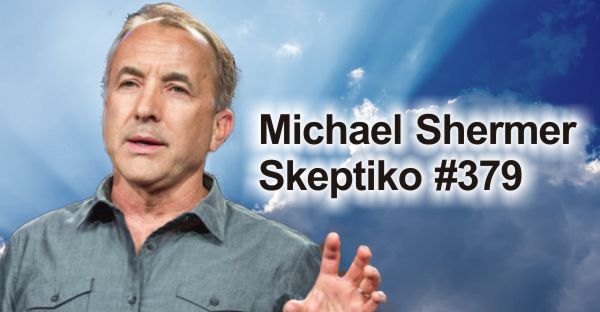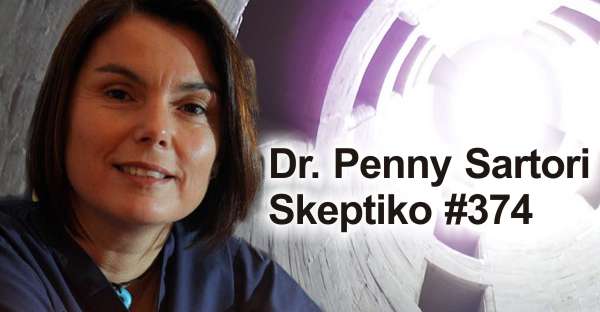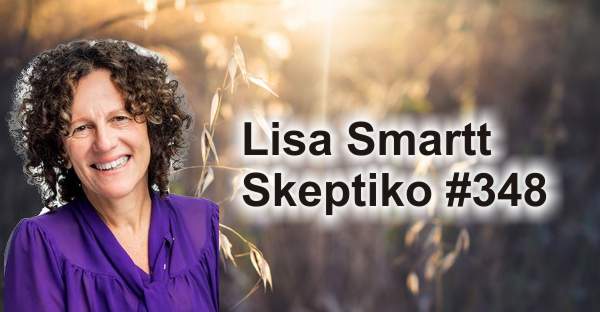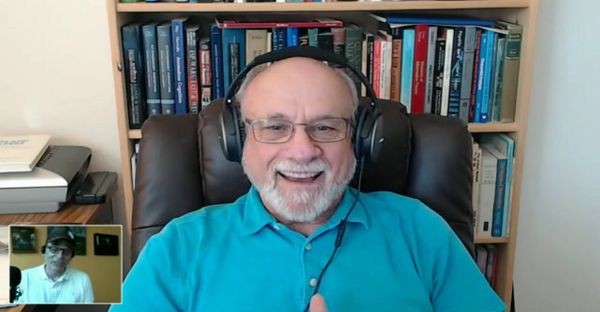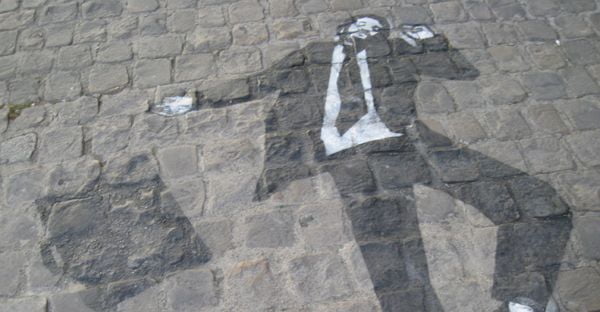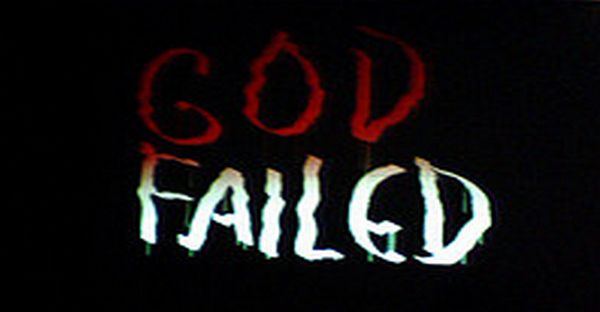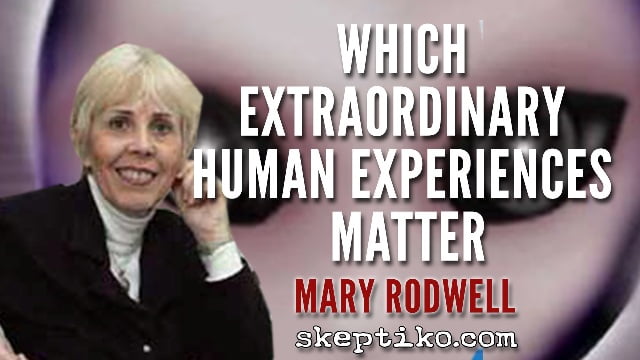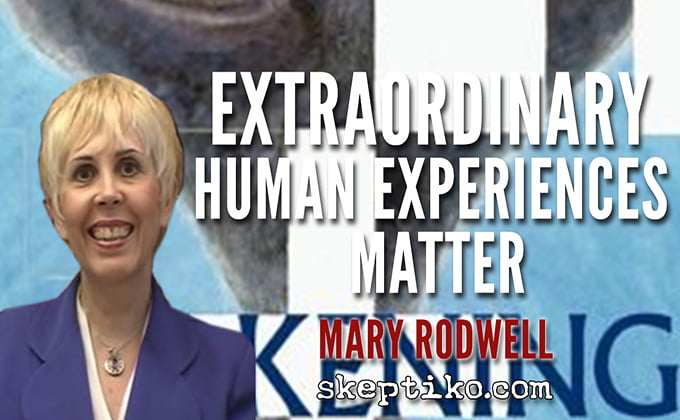Dr. Michael Shermer isn't swayed by near death experience science, but has he read the literature? photo by: Skeptiko Today we welcome Dr....
Tag: near-death experience
Dr. Penny Sartori, Are NDEs All Light and Love? |374|
Dr. Penny Sartori is a front line near-death experience researcher. Her conclusion -- it's about light and love... well mostly. photo by:...
Beverly Gilmour, 100s of NDE and a New Insight About Consciousness |350|
Beverly Gilmour has a rare medical condition that has caused her to experience 100s of NDEs. photo by: Skeptiko On this episode of...
Lisa Smartt, Linguist Explores What We Say Nearing Death |348|
Lisa Smartt examines what our final words tell us about consciousness and the afterlife. photo by: Skeptiko On this episode of Skeptiko…...
Ex-Stargate Head, Ed May, Unyielding Re Materialism, Slams Dean Radin |341|
Dr. Ed May ran the U.S. Stargate psychic spying program for 10 years, but as a materialist, rejects psychic woo. photo by: Skeptiko On this...
Dr. Jeffrey Long’s, God and the Afterlife – Science & Spirituality Have Collided |327|
New Near-Death Experience research from Dr. Jeffrey Long challenges science's understanding of the afterlife. photo by: Skeptiko We've covered a...
Latest Near-Death Experience Research Hit Job |326|
A critical look at an academic near-death experience book by Dr. Ben Mitchell-Yellin and Dr. John Martin Fischer. photo by: Iwan Gabovitch It's...
Dr. Piero Calvi-Parisetti, near-death experience science counters grief |319|
This physician discovered near-death experience science can help those experiencing grief. photo by: Martin Today we welcome Dr. Piero...
This prominent scientist says life is meaningless… and he’s serious |314|
Dr. Sean Carroll makes science's meaningless universe meme sound palatable in his new book, The Big Picture. photo by: Awesome Inc Dr. Sean Carroll...
How bad is this “mildly dangerous” cult? And what’s their connection to near-death experience science? |307|
The International Association for Near Death Studies (IANDS) claims their association with Eckankar is not different from other religious groups. ...
What would Oliver Sacks say about the afterlife now? |291|
Near-Death Experience Research, Dr. Jan Holden and her colleagues reveal their latest findings. photo by: Steve Jurvetson The question might sound...
Near-death experiences more than dreams, study says. But neuroscience’s denial of NDEs undaunted. |285|
Recent study of near-death experience survivors flies in the face of neuroscience's assertion about NDEs. photo by Carl A According to science's...
Neuroscience explanation of near-death experiences defies neuroscience |281|
As a philosopher, Dr. Evan Thompson thinks neuroscience model of near-death experience is fine, but what do NDE researchers say? Debate over the...
Alzheimer patient rises from deathbed, regains memory to recite poem, then passes away |278|
Dr. Michael Nahm is a biologist and researcher on the remarkable phenomenon known as terminal lucidity. Amazing Research. Interview with Dr....
Is near-death experience research scientifically respectable? What’s next for NDE research?|276|
Interview with Dr. Alan Hugenot about the future of near-death experience research. Controversy brewing. Interview with Dr. Alan Hugenot a...
How this science reporter got caught stretching the truth about NDE science |269|
Michael Shermer is a skeptical of an afterlife, but he might have gone too far when mis-reporting one researchers evidence for near-death...
What makes near-death experiences similar across cultures? L-O-V-E |265|
Interview with religious scholar Dr. Gregory Shushan on the parallels between near-death experience accounts across cultures. Join Skeptiko host...
Is the near-death experience only for Christians? One NDE expereincer thinks so |255|
Interview with Ian McCormack about his exclusively Christian interpretation of near-death experiences. Join Skeptiko host Alex Tsakiris for an...
What happened when this atheist art professor had a near-death experience? |254|
Interview with Pastor Howard Storm about his transformation from atheism by way of near-death experience. Join Skeptiko host Alex Tsakiris for an...
The real reason scientists refuse to believe near-death experiences… and how it’s linked to the pro-life movement |251|
Interview with journalist and author examines resistance to evidence suggesting consciousness survives death. Join Skeptiko host Alex Tsakiris...
246. Dr. Michael Graziano Likens Near Death Experience Research to Astrology
Click here for YouTube version Click here for forum discussion Interview with neuroscientist and author, Dr. Michael Graziano examines how...
240. Dr. David Lane Not Sandbagged — Patricia Churchland Part 2
https://www.youtube.com/watch?v=VtHzDMwQ9fw Click here for YouTube version Click here for forum discussion Interview with Dr. David Lane...
238. Why Skeptics Are Wrong… About Psychics & Mediums
237. Dr. Patricia Churchland Sandbagged by Near-Death Experience Questions
Click here for YouTube version Click here for forum discussion Interview with neurophilosophy expert Dr. Patricia Churchland reveals a lack of understanding of near-death experience science. Join Skeptiko host Alex Tsakiris for an interview with University of California, San Diego philosophy professor Dr. Patricia Churchland. During the interview Dr. Churchland seems flustered over questions about near-death experience science: Alex Tsakiris: Yeah, but I think we also have problems with the idea that consciousness is an emergent property of the brain thing? I interviewed Christof Koch from Cal Tech last year and he’s the guy who I sent people down this direction that we can no longer claim that consciousness is a product of the brain and we have to move towards this middle position where as he says, consciousness is ontologically distinct, but never really defining how consciousness begins, how consciousness ends, or exactly what the relationship is with the brain. I think a lot of people are more comfortable with Daniel Dennett and Richard Dawkins’ okay, consciousness is an illusion than they are with this middle ground. I don’t really know how that answers the big questions of what the nature of consciousness is other than just to repeat that consciousness is something that the brain does. That doesn’t tell us much. How does it begin? When does it end? What’s necessary and sufficient to cause consciousness? These are all questions that are unanswered by what you’re saying. Dr. Patricia Churchland: Well, neuroscience hasn’t got all the answers yet. Alex Tsakiris: But that’s just passing the buck. We don’t have the answers. Those are fundamental questions. If we don’t have the answers then we don’t have a theory of what consciousness is, right? Dr. Patricia Churchland: That’s what your view seems to be, all right. Alex Tsakiris: I’m just saying these are basic. When does consciousness begin? When does it end? What is necessary and sufficient to create consciousness? If we can’t answer those then what do we really have? What can we really say about consciousness? Dr. Patricia Churchland: Well, I guess we can’t say anything. Alex Tsakiris: Okay. I think we can say some things. Let me ask you this—I didn’t mean to throw you completely off. Do you want to get back to talking about your book? Dr. Patricia Churchland: No, not really. Alex Tsakiris: Okay. What do you think about near-death experience? You write quite a bit about that in your book and what is your general take on near-death experience? Dr. Patricia Churchland: Well, I’m not sure that it really matters, does it? What does it matter for? Alex Tsakiris: I think a lot of folks look at near-death experience as highly suggestive of consciousness somehow, in some way we don’t understand, surviving biological death, which would certainly falsify that other idea that it’s so tied to the brain and that consciousness ends at death. I mean, that would falsify that, right? Dr. Patricia Churchland: Oh, I’m sorry. My dog just came in. No, no, don’t do that. No, no, no, no. Forgive me, I’m sorry. Okay. So yeah, okay, I guess I’ve never have actually had a near-death experience. Have you? Alex Tsakiris: No. Dr. Patricia Churchland: Oh, okay. Alex Tsakiris: But you write quite a bit about it in your book. Dr. Patricia Churchland: So why do you want me to talk about it? Alex Tsakiris: Well, I guess one of the things I did want to ask you is in your book you ask the question, “Is there a neurobiological explanation for near-death experience?” Then you cite NDE researcher and a former guest on this show as answering that question with yes. You say that Dr. Pim Van Lommel believes the answer is yes. Is that your understanding of his research? Dr. Patricia Churchland: Well, I think there’s certainly quite a bit of evidence that at least some near-death experiences have a neurobiological basis. Of course, we can’t be sure about all of them. Maybe you had one that doesn’t have a neurobiological basis. I wouldn’t really know, would I? Alex Tsakiris: Well specifically, Dr. Churchland, you cite in your book that Dr. Pim Van Lommel holds that opinion. That’s clearly not the case. I mean, he’s written… Dr. Patricia Churchland: Has he? Uh-huh (Yes). Alex Tsakiris: Right. Do you want me to read to you what he’s written? He’s written that “The study of patients with near-death experience (and this is from The Lancet paper that you’re citing) clearly shows us that…” Patricia Churchland's Website Listen Now: Download MP3 (25 min.) Read It Welcome to Skeptiko, where we explore controversial science with leading researchers, thinkers, and their critics. I’m your host, Alex Tsakiris, and for this episode of Skeptiko I almost feel like I need to issue one of those warnings that they put on the front of shows that have content that might be inappropriate for some viewers. You know, I’m always surprised when people are squeamish over confrontation, conflict, or debate of any sort. I get that on one level. We don’t want to see people squirm and we want everyone to be nice to each other and all that. I get that. But on another level, I want you to consider that in this interview with Dr. Patricia Churchland, who I’ve really been trying to contact for years. I have emails going back several years in which I tried to contact this woman. She is a well-respected academic, Oxford educated, also UCSD which is a prestigious university out here in California, highly regarded at conferences, gives speeches, and has blabbed about these ridiculous ideas about consciousness that she has.
...233. Mary Rodwell Which Extraordinary Human Experiences Matter
Click here for YouTube version Click here for forum discussion Interview with the alien encounter researcher Mary Rodwell examines the...
232. Greg Taylor Tells Readers, Don’t Worry There Probably is an Afterlife
Click here for YouTube version Click here for forum discussion Interview with the author of, Don't Worry! There Probably is an Afterlife looks at...
228. Mary Rodwell Advocates for Alien Contactees
Click here for YouTube version Click here for forum discussion Click here to post comments on AlexTsakiris.com Interview with UFO and...
225. Kevin Williams, Creator of Near-Death.com
Click here for YouTube version Click here for forum discussion Click here to post comments on AlexTsakiris.com Interview with Kevin Williams creator of one of the leading website portals on Near-Death Experience science. Today we welcome Kevin Williams to Skeptiko. Kevin is the creator of www.near-death.com, the #1 website on near-death experiences, both in terms of visitor traffic and in terms of the comprehensive amount of information about near-death experiences, near-death research, and all topics related to this amazing phenomena. Kevin is also the author of Nothing Better Than Death: Insights from 62 Profound Near-Death Experiences. Kevin, welcome to Skeptiko. Thanks so much for joining me. Kevin Williams: Thank you, Alex. It’s my pleasure. Alex Tsakiris: So as I just mentioned, near-death.com is amazingly comprehensive. It pops up on virtually hundreds if not thousands of different search terms. Even if they’re not familiar with the website, people have probably encountered it. Start us off from the beginning. Tell us how you started it, why you started it, and the driving force behind it. Kevin Williams: First of all, I’m a big believer in synchronicity and it seems like most of my life I’ve had that. When I was a kid, my dad had a small CRT screen and for some reason I knew that I could build it so that people could ask questions to it and get answers back. I just had that in my mind for a long time. I don’t know why. Then when I went to college and got into computer science, I graduated just about the time when the Internet was taking off. Before that time I read Raymond Moody’s book, Life After Life. That was the late ‘70s. Since then I couldn’t get enough books to read on the subject. It was kind of a synchronistic time that I just happened to learn how to build websites at a time when I was fully knowledgeable about near-death experiences and a time when I was able to build a website. I started really early. Part of the reason why I get a lot of hits on different keywords is because I designed my website as a portal, which means that there are usually only two or three levels deep in my website. I built it that way specifically so that it would do that. It has the ability to access a lot of information right upfront and also it would be a lot easier to navigate. (continued below) Play It Listen Now: Download MP3 (44 min.) Read It: (continued...) Alex Tsakiris: So you did not have a near-death experience prior to starting this, is that right? Kevin Williams: Yes, that’s true. I’ve never had a near-death experience. But once you read enough of them you almost feel like this is information that you’ve known before. In fact, a lot of near-death experiencers, during their experience they’ll receive knowledge like that, forgotten knowledge. The more I read about it, the more I realized that this was true for me and that everybody has actually experienced death many times through reincarnation. So that was part of it right there.
...223. Dumbest Explanation Yet For Near Death Experience
Click here for YouTube version Click here for forum discussion Click here to post comments on AlexTsakiris.com Examination of recent research from the University of Michigan linking surge in brain activity of dying rats to near-death experience science. Join Skeptiko host Alex Tsakiris for a look at two interviews that shed light on recent reports suggesting a scientific explanation for near-death experiences has been discovered in the work of Dr. Jimo Borjigin, at the University of Michigan. The study found a surge in electrical activity in the brains of dying rats. Researcher and science writers offered this as a possible expatiation for human near-death experiences. As we’ve seen in the past, research supporting a convention explanation for near-death experience receives considerable attention form the mainstream science media. This study was no exception with stories popping up on the BBC, ABC, CBS, FOX, National Geographic and many other media outlets. (continued below) NPR's report on the research Play It Listen Now: Download MP3 (43 min.) Read It: Many Skeptiko listeners sent me this links to the various reports on this research, and I kept pointing them to a past interview I had done a couple of years ago relating to this topic, but since I never mentioned it on the show I thought I do so now. In June of 2011 I interviewed George Washington University Medical Center Professor, Dr. Lakhmir Chawla, who discovered a surge in the brain’s electrical activity seconds before death might in humans. Here’s a clip from Skeptiko episode 140: --------- Alex Tsakiris: So, Dr. Chawla, in 2009 you published a paper with the surprising discovery that some of your patients who were very close to death experienced a final surge in brain activity and the paper has gained quite a bit of traction, media attention, mainly because of this quote of yours: “We think that near-death experiences could be caused by a surge of electrical energy as the brain runs out of oxygen.” It‘s been a while since that paper was published. So first I want to ask you, do you still think that what you saw has anything to do with near-death experience? Dr. Lakhmir Chawla: Obviously all of the patients in our study passed away so there’s really no way for us to truly know if what these people were experiencing is, in fact had they survived, being the signature of a near-death experience. What we did notice which was very striking is that in all these patients--and in this study we reported on seven patients on which we had very good documentation. We’ve seen these electrical surges, EEG activity, at the end of life in over 100 patients and what we basically have, I hypothesize that when people pass away something occurs in their neural structure. We have a hypothesis for why this may be happening, that causes this large intensity of electrical energy. What we basically hypothesize further and speculate is that if somebody within the field, someone who’s having a heart attack, for example, and their heart stops and the oxygen to their brain went down and they have this sort of terminal surge of energy and then they were resuscitated and brought back, it’s very likely that they would recall that electrical surge. If they did recall that electrical surge, we hypothesize and speculate that that could be what people describe in their near-death experiences. The one thing that we’ve seen rather consistently when you read the literature of near-death experiences is that not everyone has the same imagery. Not everyone has the same experience. But the one thing that they all have in common is that the experience is very intense and very vivid. People can usually recall many, many years later on with great detail what they experienced. So it would take something that would be a very durable electrical event of energy for someone to have that. So we put those notions together and arrived at that speculation. Alex Tsakiris: Okay. I just wanted to confirm that and it’s interesting that you reference the near-death experience literature. I’ve had a chance to interview some of the world’s leading near-death experience researchers and gosh, I even went back and talked to some of them about this. I couldn’t find any of them that would even seriously entertain that kind of speculation. As a matter of fact, privately one of them told me, and this is pretty harsh, but he said, “It’s one of the dumbest explanations for near-death experience yet published.” So I guess I was really wondering exactly where you’re coming from, exactly what near-death experience research you’ve dug into that makes you feel like the speculation that you’re talking about would fit the broader research that’s been done into near-death experience. Dr. Lakhmir Chawla: No, I mean I’m not a researcher in near-death experience. That’s not my primary scientific interest. We are basically at the bedside taking care of very sick patients in the intense care unit. I don’t pretend to have any incredible insight into what these are or are not. All we are saying from our group’s scientific standpoint is that we see a very consistent signature for patients when they’re passing away. We are not the only investigators to report this; it’s now been investigated and reported by multiple investigators.
...222. Jean-Charles Chabot Explores Spiritual Hypnosis
Click here for YouTube version Click here for forum discussion Click here to post comments on AlexTsakiris.com Interview with hypnotherapist Jean-Charles Chabot examines the use of hypnotic regression for spiritual growth. Join Skeptiko host Alex Tsakiris for an interview with Montreal-based hypnotherapist Jean-Charles Chabot. During the interview Chabot talks about the use of regression therapy in overcoming phobias: Alex Tsakiris: Can you give us a quick example of a case where there was a memory from early in life, and they forgot about it, and then once they remembered it resolved some phobia for them. Jean-Charles Chabot: I’ll give you a couple of examples, one with regression in this life, and one in a past life. For example, a person had a fear of spiders. She said, “I don’t remember anything about what could explain this fear of spiders.” She couldn’t get close to a spider. So I brought her into an altered state of consciousness and I asked the unconscious mind to go back. So the first event the person went to was when she was young, lying beside a pool. She’d just gotten out of the water and there were drops of water dripping down her body. At some point there was some itching and there was a spider there. She just freaked at that point. Then what we usually do is we can ask the person a question, and say, “I don’t want you to think. I want you to feel. Does this emotion feel new like oh my god, what is this? Or does it feel familiar, like oh, not again?” It was familiar to her so I said, “Okay, now we’re going all the way back to the source.” What was very interesting was that she was about two years old and she was playing with a spider that was on her. When you’re one or two years old it doesn’t matter, right? It’s just a spider; there’s nothing wrong. She takes the spider and she puts it in her mouth. For a kid, no problem. But the problem was when the mother saw this and said, “No!” And then, boom, association of spider and dangerous, spider bad, mommy doesn’t like it so I shouldn’t like it. That’s where it all started. It’s very interesting when you have things like that that you understand where it comes from and you can do some techniques. One technique among others is the “informed child,” where you instruct the child what he would have needed to know to be conditioned by this and then we eradiate this knowledge. There are many things you can do. Alex Tsakiris: Were you able to help her over her phobia, then? Jean-Charles Chabot: Oh, yeah. It was really interesting because afterwards for me, I like to test my work. Afterwards we went into the basement looking for spiders. We found some little spiders and she could have them on her finger and she was like, “Oh my god, I never did that before.” It was really amazing. I said, “Okay, let’s take it a step higher. Let’s go to the pet shop. I had in mind like these tarantulas, those big spiders. I didn’t know they were really dangerous, so I just went to the counter and asked if it was possible to look at the tarantulas, to clear it with them. The people at the counter were like, “I’m not touching those. They can sting. They can really hurt. They won’t kill you but they can really, really hurt.” Then the owner came and said, “Oh, they’re really nice. As long as you don’t do anything that irritates them, like blowing on them or sudden moves or stuff, it’s all fine.” So he took a spider and told her to put her hand like a bridge. The spider came and she just had this amazing feeling of oh my god, this is amazing. She could do it without any problem. Jean-Charles Chabot's Website Play It Listen Now: Download MP3 (63 min.) Read It: Welcome to Skeptiko, where we explore controversial science with leading researchers, thinkers, and their critics. Today, hypnosis. In fact, a very controversial area of hypnosis—past life and between life regression, where people purport to recall and recover memories of living in a previous life, or the time they spent between lives. Quite out there, if you will, so before I start with this interview I thought I’d share a little bit about the path that I’ve taken in trying to get my arms around this topic. Let’s start with reincarnation. Obviously, billions of people believe reincarnation is true. Moreover, thousands of people have reported personal experiences or memories suggesting that it’s true. Is there any scientific evidence for this? Now since I know the Skeptiko audience, I know that a lot of you know that there’s actually quite a bit of very good evidence.
...





